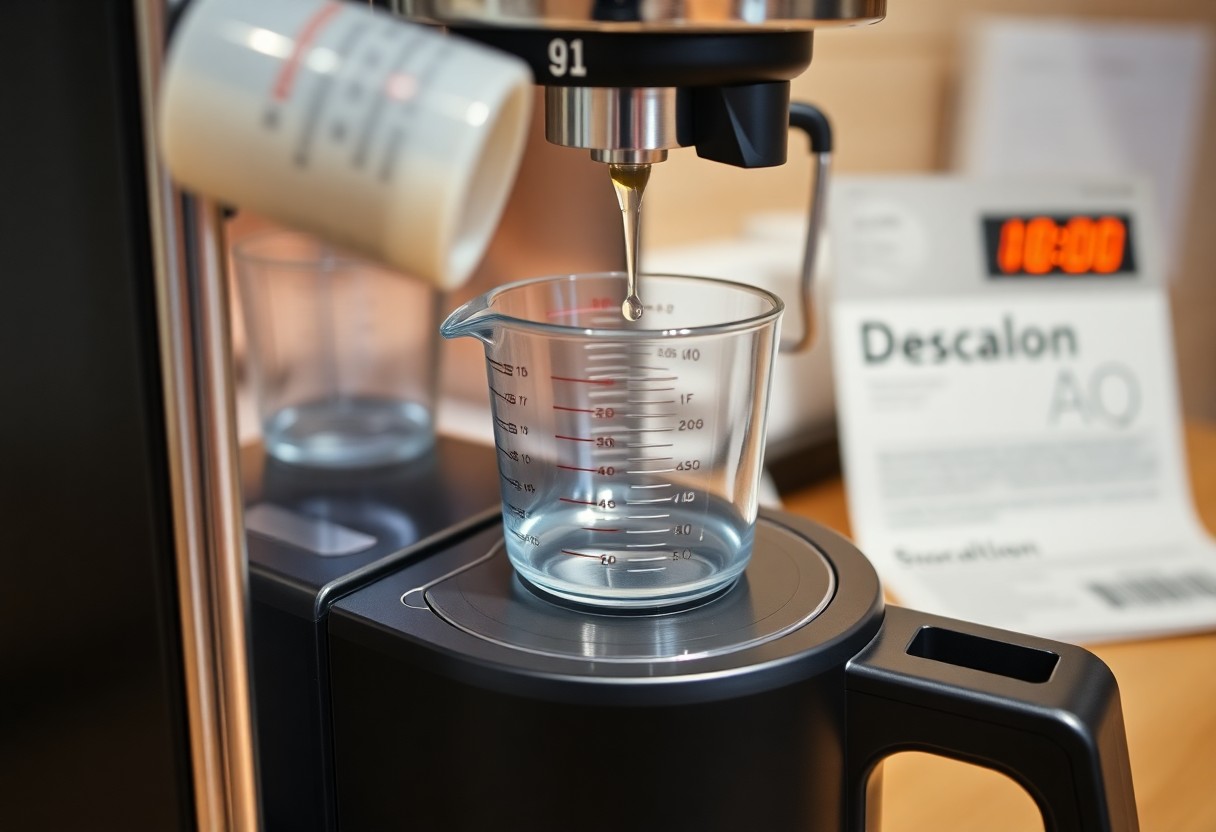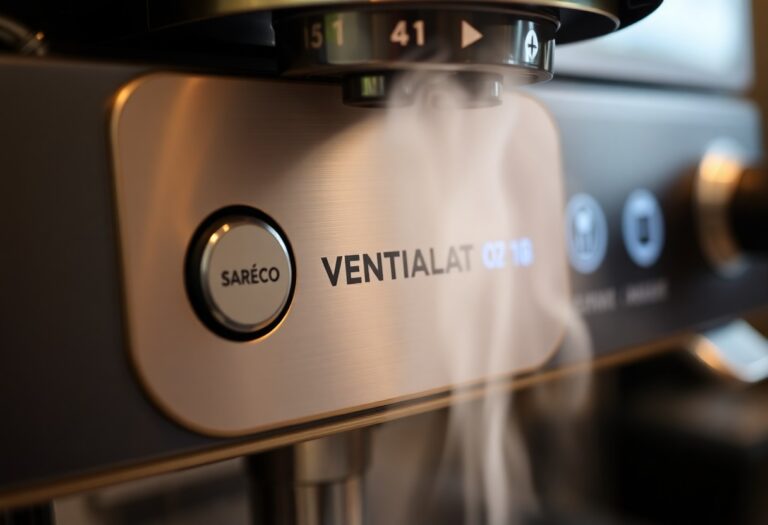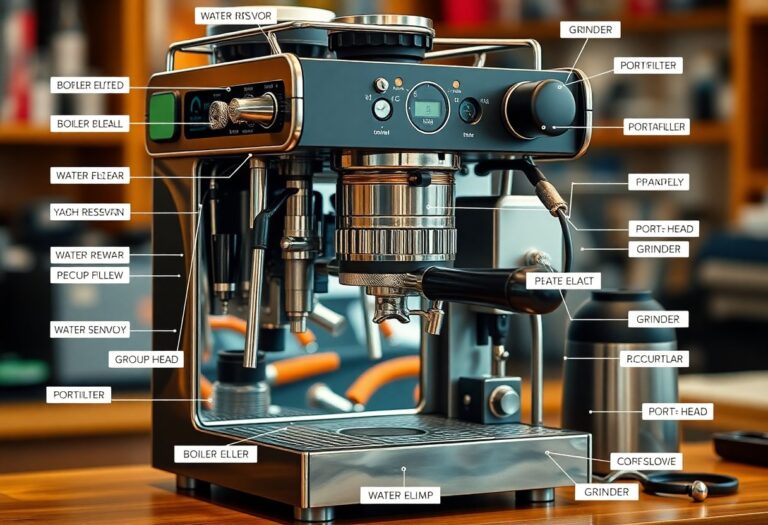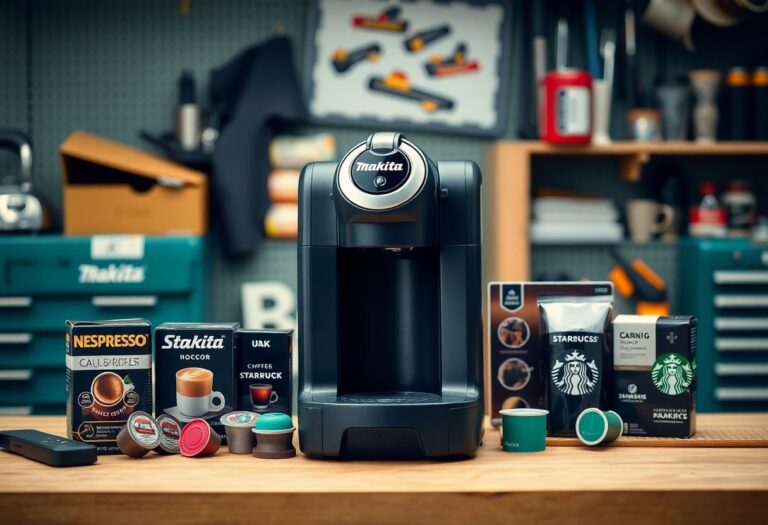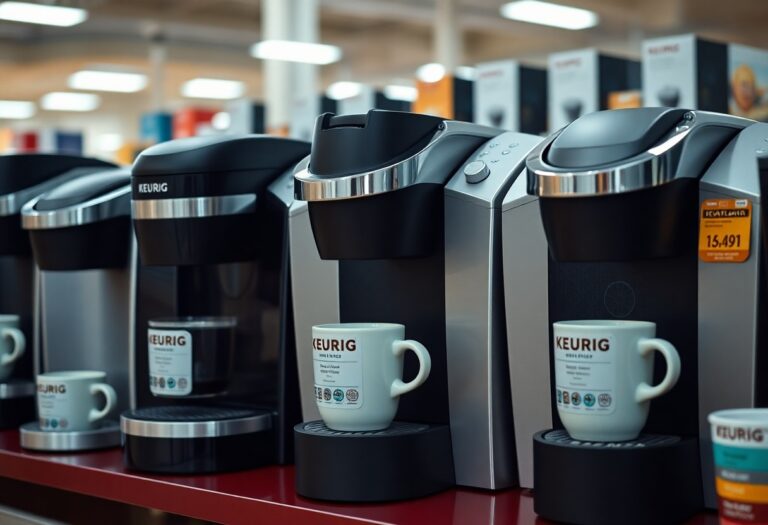What to Use to Decalcify a Coffee Machine – Descaling Solutions
Solutions for decalcifying your coffee machine are crucial to ensure optimal performance and flavor. Over time, mineral buildup can affect the taste of your coffee and even damage your machine. You can use commercial descaling solutions, which are specifically formulated for this purpose, or natural alternatives like vinegar or citric acid. Each option offers its own benefits, but choosing the right one can make all the difference in maintaining your coffee maker’s longevity and ensuring a great brew every time.
Key Takeaways:
- Descaling solutions such as vinegar, citric acid, or commercial descalers are effective for decalcifying coffee machines.
- It’s necessary to follow the manufacturer’s instructions to avoid damage during the descaling process.
- Regular descaling can extend the lifespan of your coffee machine and improve its performance.
- Be sure to rinse the machine thoroughly after descaling to eliminate any leftover solution.
- Frequency of descaling depends on water hardness and usage; aim for every 1-3 months for optimal maintenance.
The Cost of Neglecting Decalcification
Failing to decalcify your coffee machine can lead to a range of costly consequences. Over time, mineral buildup can reduce the machine’s efficiency, leading to a potential breakdown and the need for expensive repairs or replacements. Regular descaling ensures that your investment remains functional and prolongs its lifespan, ultimately saving you money.
Hidden Damage to Your Coffee Machine
Ignoring decalcification can result in hidden damage that may not be immediately visible. Mineral deposits can accumulate inside pipes and heating elements, leading to clogs and overheating. This buildup can strain the machine, eventually causing internal components to fail, resulting in costly repairs or replacement. Prevention is significantly cheaper than dealing with the aftermath of neglect.
Impacts on Taste and Quality of Brew
The flavors of your coffee can be dramatically affected by mineral buildup in your machine. Over time, this residue can interfere with the brewing process, resulting in a bitter or dull cup of coffee that lacks the rich flavors you expect. A machine that isn’t regularly descaled may also brew at improper temperatures, further diminishing the quality of your final beverage.
For example, coffee brewed with excessive calcium deposits might taste flat or even burnt, leading you to believe the beans are subpar. If you’re enjoying a specialty roast that typically offers bright acidity and rich notes, a neglected coffee machine can mask these qualities. Regularly descaling not only preserves the machine’s function but ensures that each cup reaches its full potential in flavor, allowing every sip to be a delightful experience.
The Science of Limescale Formation
Limescale forms in coffee machines due to the process of mineral deposition from hard water. As water is heated and vaporized during brewing, minerals like calcium and magnesium precipitate out, leading to a buildup on internal components. This not only reduces efficiency but can also affect your coffee’s flavor. For more guidance on how to tackle this issue, check out We Set Out to Find the Best Coffee-Maker Cleaner.
Understanding Hard Water and Its Effects
Hard water contains high levels of dissolved minerals, primarily calcium and magnesium. When you use hard water in your coffee machine, these minerals can cling to surfaces and form limescale, ultimately leading to reduced performance. Over time, this buildup can restrict water flow, causing your machine to work harder, resulting in a shorter lifespan and higher energy consumption.
Why Regular Maintenance Matters
Regular maintenance of your coffee machine extends its lifespan and ensures optimal performance. Neglecting limescale buildup can lead to permanent damage, affecting not just your machine’s functionality but also the quality of your coffee. A clean machine brews better-tasting coffee, capturing the full flavors of your favorite beans without interference from mineral deposits.
Taking the time to descale your coffee machine regularly can save you from costly repairs down the line. It’s recommended to perform maintenance every three to six months, depending on your water hardness. For an average coffee drinker, this simple routine can drastically improve brew quality and decision-making, ultimately enhancing your daily coffee experience.
Natural vs. Commercial Descaling Solutions
Choosing between natural and commercial descaling solutions depends on your preferences and the severity of limescale buildup in your coffee machine. Natural options, such as vinegar and citric acid, are cost-effective and environmentally friendly. However, they might not always provide the same level of efficacy as specialized commercial descalers. Conversely, commercial options are formulated specifically to tackle tough mineral deposits, offering convenience and reliability with minimal effort on your part.
The Efficacy of Household Ingredients
Household ingredients like vinegar and baking soda can be effective for light scaling, making them a popular choice for maintenance. White vinegar’s acidity helps dissolve mineral deposits, while citric acid targets calcium build-up more efficiently. Yet, their effectiveness may wane with heavy limescale deposits, requiring more regular application and higher quantities to see results.
A Review of Popular Commercial Options
Several commercial descaling agents are widely recognized for their effectiveness, such as Dezcal and Urnex. These products are designed specifically for coffee machines and contain potent acids that safely remove build-up without damaging internal components. Each option is straightforward to use, often requiring you to mix the descaler with water and run it through your machine, which simplifies the decalcification process significantly.
For those seeking effectiveness and convenience, products like Dezcal Action are particularly notable, utilizing a non-toxic formula that safely and efficiently tackles limescale buildup. Urnex, on the other hand, is highly rated for its compatibility with various coffee machine types, ensuring good performance across diverse brands. Many users report noticeable improvements in their coffee’s flavor and machine operation after using these commercial solutions, justifying their higher price point compared to homemade alternatives. Whether choosing vinegar or a dedicated product, regularly descaling will prolong your coffee machine’s lifespan, ensuring optimal brewing conditions for your daily cup of joe.
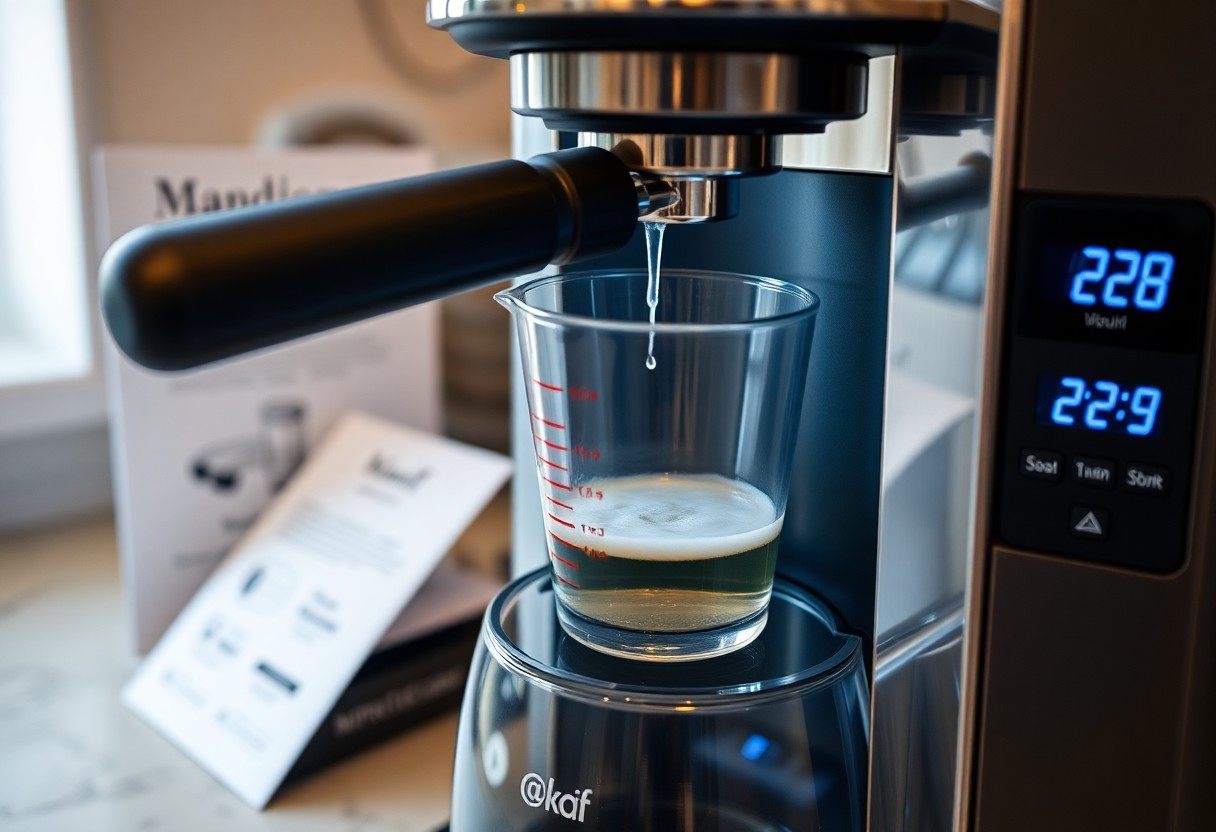
Step-by-Step Guide to Effective Descaling
| Steps | Description |
|---|---|
| 1. Preparing Your Coffee Machine for Descaling | Ensure your machine is disconnected and water reservoir is empty. |
| 2. Executing the Descaling Process | Follow the manufacturer’s instructions for your descaling solution. |
Preparing Your Coffee Machine for Descaling
Begin by disconnecting your coffee machine from the power source and removing any coffee pods or filters. Empty the water reservoir completely and rinse it to remove any residual coffee oils. Consider placing a large container underneath the coffee spouts to capture the descaling solution as it drains from your machine.
Executing the Descaling Process
Mix the descaling solution according to the package directions and pour it into the water reservoir. Some models may have a specific descaling mode; if yours does, activate it. Allow the solution to cycle through the machine, and then let it sit for 15-30 minutes to effectively break down limescale buildup.
During the descaling cycle, your machine will heat the solution and push it through the internal components, efficiently flushing out limescale. If your coffee maker has a specific cleaning cycle, ensure that you activate that option. After completing this step, it’s important to thoroughly rinse the water reservoir and flush the machine with clean water multiple times to eliminate any residual descaling solution, ensuring that your next brew is free from unwanted tastes.
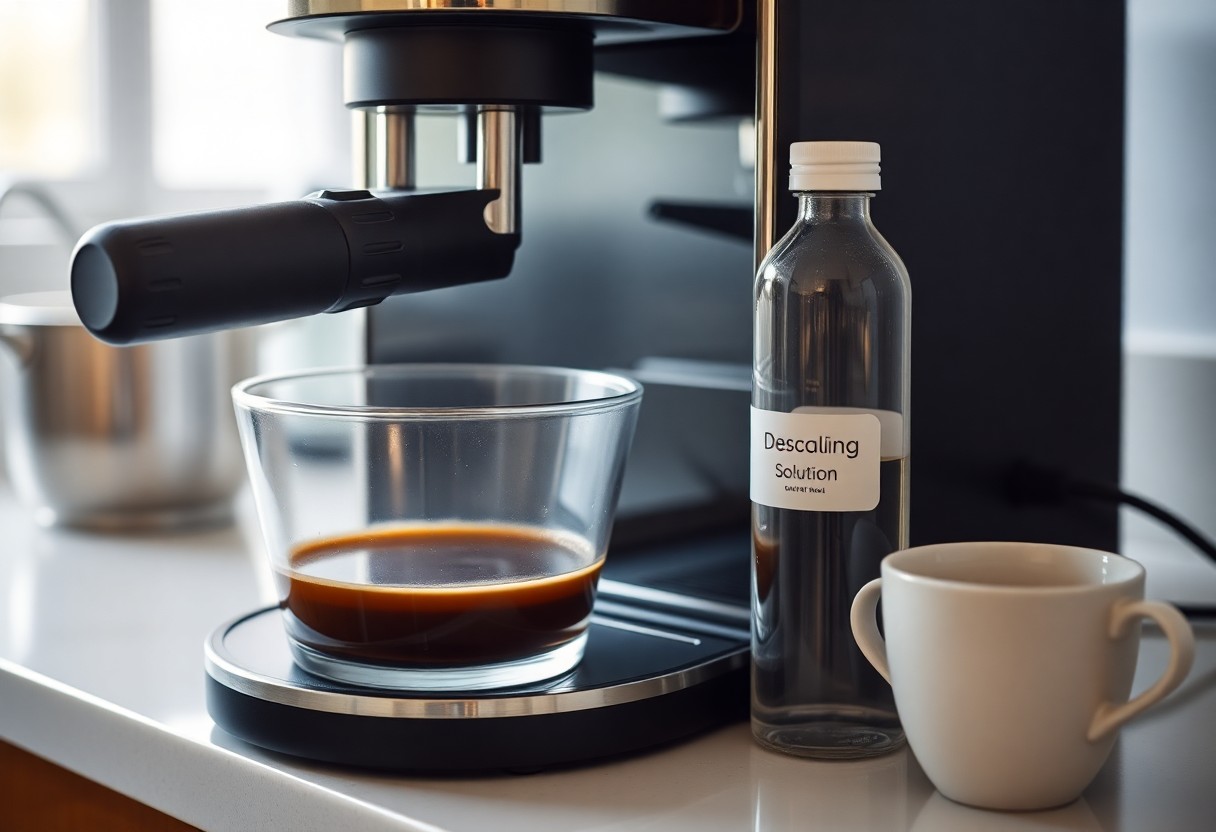
Maintenance Tips to Prevent Future Build-Up
To keep your coffee machine in peak condition and avoid limescale build-up, adopt a few simple practices. Regularly monitor your machine for any deposits and clean it periodically using the right solutions. Be mindful of your water quality, as hard water contributes significantly to mineral accumulation. Here’s a quick list of tips:
- Use filtered or bottled water to minimize mineral content.
- Run a descaling solution through your machine every 1-3 months.
- Clean removable parts by hand after each use.
- Store your coffee machine in a cool, dry place.
This proactive approach not only preserves the taste of your brew but also extends the lifespan of your machine.
Regular Maintenance Routines
Establishing a routine for cleaning and maintaining your coffee machine will go a long way in preventing scale buildup. Aim to perform deep cleanings every couple of months, and check water reservoirs and filters at least once a month. Simple actions like removing and washing the carafe, and ensuring no coffee grounds are left behind can help maintain optimal performance.
Smart Water Choices for Optimal Brewing
Your choice of water significantly impacts the quality of your coffee and the maintenance of your machine. Using filtered water can greatly reduce limescale accumulation compared to using tap water high in minerals. Additionally, look for water with a lower calcium and magnesium content. The ideal range for brewing coffee involves water with a hardness level between 50-150 ppm (parts per million).
When you select the right type of water, not only do you limit the potential for limescale, but you also enhance the flavor of your coffee. Filtered water improves taste by removing impurities and unwanted chlorine, which can alter the brewing process. Ideally, investing in a water filtration system or using bottled water labeled as “soft” can help you maintain a cleaner machine and a better cup of coffee.
To wrap up
From above, you’ve learned about various descaling solutions that effectively decalcify your coffee machine, ensuring optimal performance and longevity. Whether you opt for commercial descalers, vinegar, or citric acid, using these solutions will help keep your machine running smoothly and enhance the flavor of your coffee. Regular maintenance with the right descaling agent will not only improve your coffee experience but also save you from potential repairs in the future. By following these necessary steps, you can enjoy a better brew every time.
FAQ
Q: What is a descaling solution and why is it important for my coffee machine?
A: A descaling solution is a specially formulated liquid that helps to remove mineral buildup, mainly calcium and lime deposits, from your coffee machine. Over time, these deposits can affect the performance and taste of your coffee. Using a descaling solution regularly ensures that your coffee machine operates efficiently and produces high-quality beverages.
Q: What natural ingredients can I use to descale my coffee machine if I want to avoid commercial products?
A: If you prefer natural alternatives, a common solution is to use a mixture of equal parts vinegar and water. Another option is citric acid, which can be mixed with water in a 1:1 ratio. These natural ingredients can effectively help dissolve mineral deposits without the harsh chemicals found in some commercial descalers.
Q: How often should I descale my coffee machine?
A: The frequency of descaling depends on how often you use your coffee machine and the hardness of your water. As a general rule, it’s advisable to descale your coffee machine every 1-3 months. If you notice sluggish performance, off-flavors, or a warning light on your machine, it’s a sign that descaling is needed sooner.
Q: Can I use any descaling solution for my coffee machine, or do I need to choose specific brands?
A: While many descaling solutions are effective, it’s best to use products specifically designed for coffee machines. Always check the manufacturer’s recommendations found in your coffee machine’s user manual. Some brands may require specific descalers to avoid damage or voiding the warranty.
Q: What steps should I follow to descale my coffee machine properly?
A: To descale your coffee machine, first mix the descaling solution with water according to the directions on the product or your natural mixture. Fill the water reservoir with the solution, then run a brewing cycle without coffee grounds. After the cycle is complete, run 2-3 cycles with fresh water to thoroughly rinse the machine. Always consult your user manual for specific instructions and recommendations.

